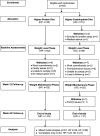Comparison of two low-fat diets, differing in protein and carbohydrate, on psychological wellbeing in adults with obesity and type 2 diabetes: a randomised clinical trial
- PMID: 29907153
- PMCID: PMC6004092
- DOI: 10.1186/s12937-018-0367-5
Comparison of two low-fat diets, differing in protein and carbohydrate, on psychological wellbeing in adults with obesity and type 2 diabetes: a randomised clinical trial
Abstract
Background: Although higher-protein diets (HP) can assist with weight loss and glycemic control, their effect on psychological wellbeing has not been established. The objective of this study was to compare the effects of a HP and a higher-carbohydrate diet (HC), combined with regular exercise, on psychological wellbeing both during weight loss (WL) and weight maintenance phases (WM).
Methods: In a parallel RCT, 61 adults with T2D (mean ± SD: BMI 34.3 ± 5.1 kg/m2, aged 55 ± 8 years) consumed a HP diet (29% protein, 34% carbohydrate, 31% fat) or an isocaloric HC diet (21%:48%:24%), with moderate intensity exercise, for 12 weeks of WL and 12 weeks of WM. Secondary data evaluating psychological wellbeing was assessed using: Problems Areas in Diabetes (PAID); Diabetes-39 Quality of Life (D-39); Short Form Health Survey (SF-36); Perceived Stress Scale-10 (PSS-10) and the Leeds Sleep Evaluation Questionnaire (LSEQ) at Weeks 0, 12 and 24 and evaluated with mixed models analysis.
Results: Independent of diet, improvements for PAID; D-39 diabetes control; D-39 severity of diabetes; SF-36 physical functioning and SF-36 general health were found following WL (d = 0.30 to 0.69, P ≤ 0.04 for all) which remained after 12 weeks of WM. SF-36 vitality improved more in the HP group (group x time interaction P = 0.03). Associations were seen between HbA1c and D-39 severity of diabetes rating (r = 0.30, P = 0.01) and SF-36 mental health (r = - 0.32, P = 0.003) and between weight loss and PAID (r = 0.30, P = 0.01).
Conclusion: Several improvements in diabetes-related and general psychological wellbeing were seen similarly for both diets following weight loss and a reduction in HbA1c with most of these improvements remaining when weight loss was sustained for 12 weeks. A HP diet may provide additional increases in vitality.
Trial registration: The trial was prospectively registered with the Australian New Zealand Clinical Trials Registry (ACTRN 12613000008729 ) on 4 January 2013.
Keywords: Dietary protein; Emotional distress; Psychological wellbeing; Quality of life; Type 2 diabetes; Weight loss; Weight maintenance.
Conflict of interest statement
Ethics approval and consent to participate
This study was approved by the Research Ethics Committees of the University of South Australia and the Commonwealth Scientific and Industrial Research Organization. The trial was prospectively registered with the Australian New Zealand Clinical Trials Registry (ACTRN 12613000008729) on 4 January 2013. Prior to commencement, participants provided written informed consent.
Competing interests
The authors declare that they have no competing interests.
Publisher’s Note
Springer Nature remains neutral with regard to jurisdictional claims in published maps and institutional affiliations.
References
-
- Nicolucci A, Burns KK, Holt R, Comaschi M, Hermanns N, Ishii H, Kokoszka A, Pouwer F, Skovlund S, Stuckey H. educational and psychological issues diabetes attitudes, wishes and needs second study (DAWN2TM): cross-national benchmarking of diabetes-related psychosocial outcomes for people with diabetes. Diabet Med. 2013;30:767–777. doi: 10.1111/dme.12245. - DOI - PubMed
-
- Skovlund SE, Peyrot M. The diabetes attitudes, wishes, and needs (DAWN) program: a new approach to improving outcomes of diabetes care. Diabetes spectrum. 2005;18:136–142. doi: 10.2337/diaspect.18.3.136. - DOI
Publication types
MeSH terms
Substances
LinkOut - more resources
Full Text Sources
Other Literature Sources
Medical
Research Materials
Miscellaneous


